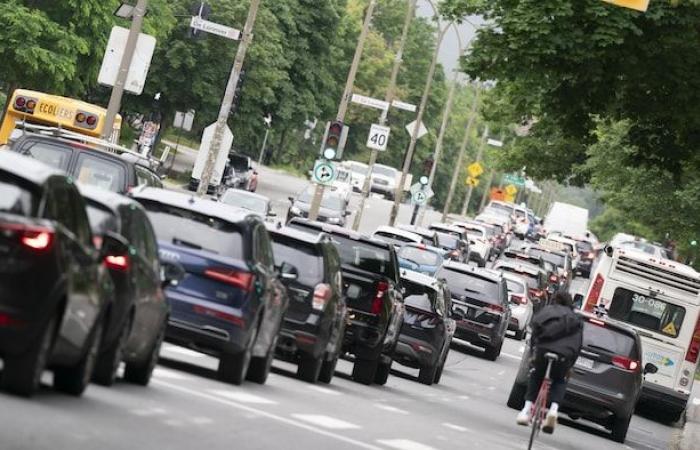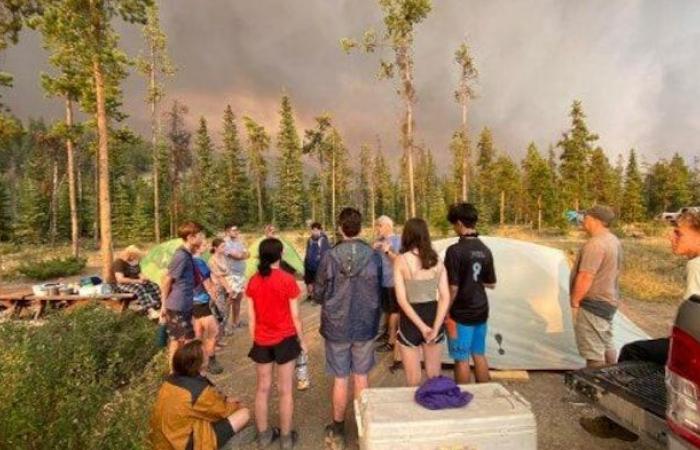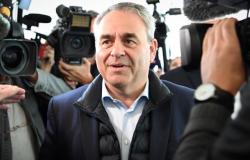No, but what a year!
The year 2024 is slowly evaporating and leaving acrid environmental odors in its wake. Reading the description given by scientists of the state of the planet, we admit that it is difficult to find a gap through which a little light can pass, and which would make us want to dive into the year to come .
The year 2024 will, in all likelihood, be the hottest on record. Even hotter than 2023, which was already breaking records. The consequences of this new reality are well known: extreme weather events now spare no continent.
The forest fires that ravaged the historic town of Jasper and the torrential rains from the tail of Hurricane Debby that flooded the greater Montreal area left a strong mark on minds and turned lives upside down.
As the years pass, the mercury rises, and our feeling of helplessness grows. As bad news accumulates, our fatigue with environmental news increases. We end up dropping out.
We have the impression of doing the maximum of what is possible, we feel that the task is too complex anyway, that our sacrifices do not achieve much, that it costs us too much, and worse, that all these policies end up harming our individual freedoms.
All over the planet, politicians know how to take advantage of these feelings, proposing solutions that return to the status quo.
Faced with this somewhat gloomy collective state of mind, let us dare to have two wishes for the coming year: one for our political leaders, and another for us, the citizens.
Open in full screen mode
The Prime Minister of Quebec, François Legault, as well as his counterpart from Newfoundland and Labrador, Andrew Furey, announced with great fanfare a new agreement in principle in Saint-Jean, which should bring in no less than “200 billion dollars” to each of the two partners, according to their calculations.
Photo: The Canadian Press / Paul Daly
Dare to have a long-term vision
One of the images I keep from the year 2024 is certainly the broad smile worn by the premiers of Quebec and Newfoundland and Labrador during the signing of the new agreement in principle on the hydroelectric power station of Churchill Falls. A rare moment that can be described as historic, where both parties seem to have found what they wanted.
What is remarkable and which has been little emphasized is the fact that the Quebec government has taken this action while being guided by a real vision of the energy future of its territory: it is depriving itself of significant sums now, to save later, and to establish in the long term a structure that will promote the economic well-being of current and future generations. This is what we call in economics an investment.
We are spending now, to reap benefits that will come long after the very short electoral deadline.
A wish for 2025: that this kind of vision also applies to public transport. A sector which requires very large investments initially, but which has a real long-term structuring capacity for the economy.
For foreign companies that must choose a city in which to establish themselves, the quality of public transport networks is now one of the most important criteria.
It is not an ideological position to assert that with the growing urbanization of countries, mobility necessarily involves the development of public transport. Even the biggest supporters of solo driving admit this, since improving public transportation – if the networks are well designed – reduces road congestion. Everyone benefits.
Open in full screen mode
The streets are very busy during rush hours in Montreal.
Photo : - / Ivanoh Demers
But it's not just the economy. Quebec presents itself in all national and international forums as a leader in the fight against climate change.
When we compare ourselves to our North American neighbors, this is not completely false. But the statistics are stubborn: almost half of Quebec's greenhouse gas (GHG) emissions come from transportation (43.3%). Road transport alone – that is, you and I traveling with our vehicle – accounts for a third of all emissions. It's major.
To improve this situation, the Legault government promised to correct the existing imbalance between road investments and those used to develop public transport. However, to date, if we rely on the very recent Quebec Infrastructure Plan 2024-2034, public transport will collect less than a third (29%) of the new pot for mobility infrastructures. The rest will go to the road network.
Of course, building a truly structuring public transport network is very expensive. But note one thing: the agreement with Newfoundland and Labrador is also expensive in the short term, but we can measure the benefits in the long term.
States that succeed in effectively improving their public transportation network do not do so with public money alone. They demonstrate great creativity in diversifying funding sources. And they use the most recent scientific and demographic data to ensure fine and detailed planning of a real, integrated and large-scale network, before breaking ground.
In short, they demonstrate vision.
This wish obviously does not only concern the government of Quebec or the simple transport sector. It applies to all sectors and to all people in a position to influence the course of things.
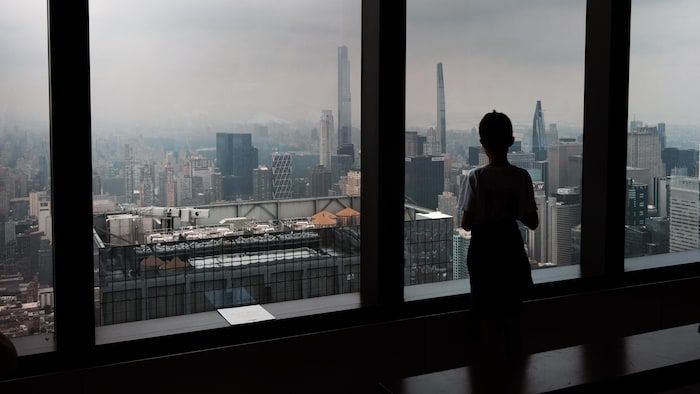
Open in full screen mode
Smoke from Canada's wildfires fills New York's skies in 2023.
Photo : Getty Images / Spencer Platt
Think of others
This is my other wish for 2025.
Individualism is perhaps one of the greatest threats to environmental health. This tendency to assert oneself independently of others seems to harm the preservation of nature, a reality well documented in the very recent report by IPBES scientists (New window)which is the equivalent of the IPCC for biodiversity.
A fascinating report, in which hundreds of scientists participated, and which all policy makers should read from cover to cover.
The interest of this important document is that the experts return to the roots of the three major crises which threaten our living environments: climate change, the destruction of biodiversity and pollution, in particular air pollution and plastic pollution.
Scientists reveal three major underlying causes of environmental degradation: our disconnection from and domination over nature, the inequitable concentration of power and wealth, and the prioritization of short-term individual and material gains .
Great food for thought, which reminds us that the three crises all call for the same basic solution: collaboration.
It was while reading this report that one of my wishes for the year 2025 came to me: what if we tried a little more to think of others?
In the broadest sense of the term: thinking of others also means striving to awaken within us our spirit of collaboration, sometimes agreeing to make sacrifices for the happiness of others and striving to project into the future, into this future world whose viability depends largely on the decisions we make today.
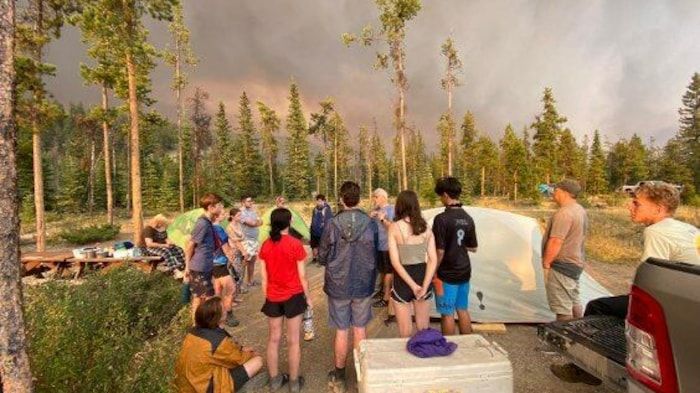
Open in full screen mode
A scout troop hastily packed up to escape the fire that threatens in the distance.
Photo: Courtesy Devin Morrison
Because despite our wealth and our well-being, crises know no borders and today spare no continent or population. This idea that we should do nothing just because other countries or our neighbors are doing nothing will not lead us anywhere and will not allow us to avoid suffering the consequences of the degradation of nature.
If no one does anything while waiting for the other to act, a downward spiral is guaranteed. We are condemned to collaborate, to act together and to think of others.
It's very easy to say, but not so easy to do. I'm the first to admit it.
Because we often have the impression that the solutions put forward to protect the environment violate our individual freedoms.
For example, taxing pollution pushes up the price of the gasoline we put in our cars; creating bicycle paths and reserved bus lanes restricts the ability of motorists to travel; taxing large vehicles, plane flights or red meat more restricts our freedom of choice; protecting wetlands near urban areas prevents residential development, etc. You certainly have your own examples.
There are so many opportunities to bring everything back to ourselves and too often we forget that the sacrifices imposed on us today will ensure the well-being of those who will be there tomorrow.
No one likes having measures imposed on them that aim to change their habits. This feeling of comfort that we need is largely based on this routine. Such a reaction is completely normal.
And too often, these policies are poorly explained, poorly designed or even target the wrong group. It then becomes difficult to make the links between the sacrifices that are imposed on us in the immediate future and the benefits that they could have in the long term.
And if, in addition, these policies constantly eat away at our purchasing power, without attacking those mainly responsible for the situation who really have the means, we feel an injustice.
An emotion, as I said above, that certain politicians know how to exploit.
We are all in search of happiness. But the path, you will agree, is arduous. Faced with the complexity of the world and the difficulty of finding our place in it, we sometimes withdraw into ourselves.
However, making the effort every day to care about others, to think, in our daily lives, of those who will make the world of tomorrow, can also be a great source of well-being. This phenomenon has also been well documented by experts.


